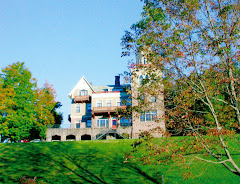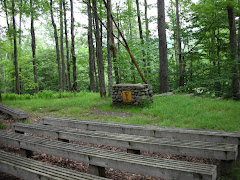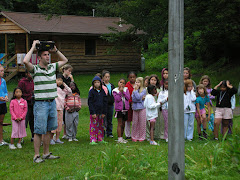 I always take the very end of summer, the coming of autumn, as if a death is occuring. The end of something (is Hemingway's phrase). Early dusk; colder nights; the first hints of orange leaves. (Ever notice the one tree that turns orange and yellow first at Frost Valley? It's the one along the road in front of the Lake House.) When I was 9 years old I used to think, at least momentarily, that my camp friends just went dormant for the year and would exist again next July. They ceased to exist for me, and that was pretty much right (in the days before IM and email and Facebook).
I always take the very end of summer, the coming of autumn, as if a death is occuring. The end of something (is Hemingway's phrase). Early dusk; colder nights; the first hints of orange leaves. (Ever notice the one tree that turns orange and yellow first at Frost Valley? It's the one along the road in front of the Lake House.) When I was 9 years old I used to think, at least momentarily, that my camp friends just went dormant for the year and would exist again next July. They ceased to exist for me, and that was pretty much right (in the days before IM and email and Facebook). Then there are the real falls. George Marion suffered mightily as a young person with renal failure. There was at least one transplant, unsuccessful. He came back as a camper year after year. This photo of him is from a Lenape village portrait shot in 1980. We became attached to George, and he to us. He wasn't really cut out for being a staff member, but he was a passably good CIT and then a JC - in Totem, I believe, with the little kids. And he loved every minute of it. But he got tired, fast. One sensed it was the beginning of an end. I believe he left camp suddenly after one health crisis or another, having to do with his heart, I think. Later, in the fall, we heard that he has passed away.
The "dialysis program," as we call it (not quite accurately), was meant to give pleasure to people whose lives would be almost certainly shortened, if not dramatically shortened, by the effects of their complex disease. Especially in the early days, there was very little longitudinal information: how long could these kids last. "A few years earlier," the camp nephrologist would explain, "we didn't really have ways to keep them alive for very long. Now that we can keep them alive, we have no idea what the long-term side effects of the treatment will be." (Today, I should add, and happily, kids with renal failure have much improved survival, although they still face major and more or less constant threats.)
 It's just the story that Eva Gottscho tells about her daughter Ruth Carole, who died of renal disease in 1960. Eva wanted to give Ruth the quality of real life: fun. "She never got to go to camp, although it was really what she wanted," Eva would say (I've heard her tell the story a dozen times).
It's just the story that Eva Gottscho tells about her daughter Ruth Carole, who died of renal disease in 1960. Eva wanted to give Ruth the quality of real life: fun. "She never got to go to camp, although it was really what she wanted," Eva would say (I've heard her tell the story a dozen times).It was also what George Marion wanted. And thanks to Eva--and to the efforts of George's counselors (among them Paul Webster) and the staff of the dialysis unit (Michele Palamidy and Stu Kaufer in particular)--he got what he wanted for a few blissful summers.
Here's to George!
Here's to autumn! All right, let it come and with it, the memories.
If you have a good George Marion story, please send it to me. Click on the envelope icon below.
Or, for that matter, a good Tommy Morales story. Tommy is shown above in a photo taken in 1982. Tommy had a kidney transplant for a few years, but it failed; he is also deceased.











